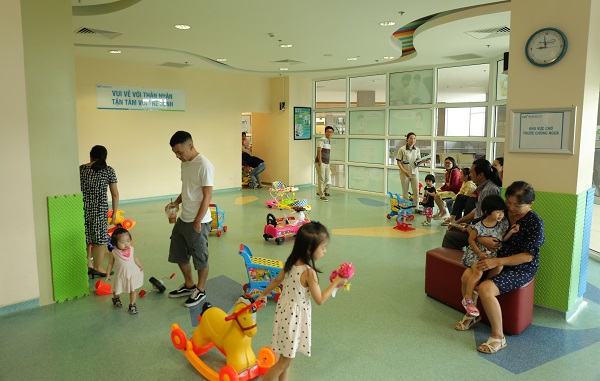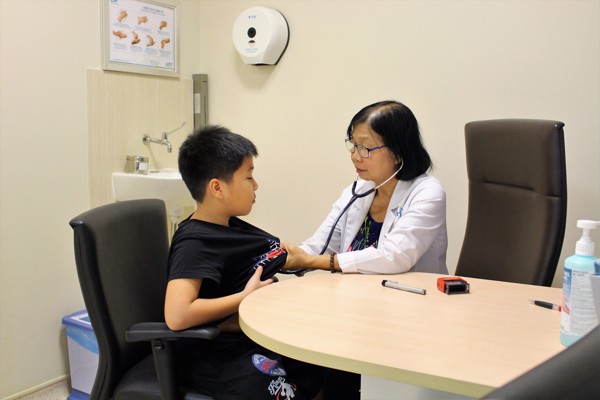Malnutrition is an umbrella term for poor intake of food. This could be an excess consumption of nutrients (overnutrition) or inadequate consumption of nutrients (undernutrition). Undernutrition occurs when a person consumes fewer calories of energy than they need over a long period of time. The Body Mass Index (BMI) is a popular indicator of undernutrition. This is the weight of a person in relation to their height, and is determined by dividing the body weight in kilograms by the body height (in meters) squared. A person with a Body Mass Index (BMI) of 18.5 and lower is considered malnourished.
Signs of malnourished children
The symptoms of malnourished children may include such causes as: the weight is not growing as expected. Or lose 5-10% (or more) of the child's body weight within 3-6 months.
Changes in behavior such as frequent crying, less play and less flexible, the body is slower than their peers. The limbs are soft and soft, the abdomen is gradually enlarged. In particular, the most noticeable sign is when the child has developmental delays such as sluggishness, sitting, crawling, walking.
In order to determine if a child is malnourished, parents can also rely on standard indicators to compare with their children.
- The first is based on weight by age. When a newborn weighs 3kg, after 5 months to double, 12 months to triple; then increase by 2kg each year. When 6 years old baby, the weight must be 20kg. If in a remote area without weight, you can measure the arms of children 1-5 years old. Normal children 14-15cm; if less than 13cm is malnourished.
- The second is based on height by age. When a baby is born 50cm long, 6 months 65cm long, 12 months: 75cm, 2 years old: 85cm, 3 years old: 95cm, 4 years old: 100cm. After that, every year the height will increase by 5cm, when the 8 year old child must be 120cm tall.
- Children are most vulnerable to malnutrition between 6 and 24 months of age. This is the time when babies with high nutritional needs, are adapting to the environment and very sensitive to disease, especially those who are not breastfed, underweight or multiples. Babies in families with a lot of children, poor sanitary conditions or suffering from infectious diseases (such as measles, diarrhea or respiratory infections) are also susceptible to malnutrition.

Malnourished children will be more picky than normal children.
Adequate diet of food groups helps children gain weight steadily and grow well.
The cause of malnutrition
Malnutrition in children can be caused by one or more of the following reasons: Infants not exclusively breastfed for the first 6 months, not getting enough breast milk and feeding their babies too early (before 6 months) are often not Get all the nutrients. Unsuitable foods or children may not eat a variety of different foods.
Because children often suffer from infectious diseases (diarrhea, pneumonia, helminths ...), they must use pathogenic germicides, and at the same time will eliminate the beneficial bacteria in the intestinal tract, reducing over Food fermentation leads to malabsorption and anorexia.
Children encounter psychological problems when families have forced actions to feed their children, making them more likely to develop a long-term psychological fear that will cause anorexia and malnutrition.
Consequences of malnutrition
Weakened immune system: Malnutrition due to micronutrient deficiency (zinc, iron and vitamins) will weaken the immune system. At this time, children are susceptible to respiratory and intestinal infections.
Causing mental and physical retardation in children: If the gastrointestinal tract is concurrent with malnutrition, the child's body will not be able to absorb the nutrients in food. This can cause mental and physical retardation in children. Malnourished children often have reduced brain development, sluggishness, reduced learning, low social, social interaction and lower ability to work as adults.
Malnutrition causes all organs to develop, especially musculoskeletal system, to directly affect the height and stature of children.
Measures to prevent malnutrition in children
The percentage of malnourished children right at birth due to maternal deficiency during pregnancy is very high. Therefore, you should pay attention to getting enough nutrients during pregnancy with iron / folic acid or micronutrient tablets. In addition, if mothers do not use milk and dairy products, eat less fish, shrimp, beans, they need to supplement calcium for mothers.
Breast milk is very good for babies and children. In breast milk has provided enough nutrients for children. Therefore, breastfeeding should be at least for the first 6 months. Breastfeeding after birth and lasting from 18-24 months, if the mother does not have enough milk, she needs an appropriate source of milk to replace the baby.
Have a reasonable diet for children to gain weight healthily: Feed babies at 6 months of age, eat 4 main food groups such as flour, sugar, fatty proteins, vitamins and minerals. Note to choose fresh foods, restrict processed foods, cook foods thoroughly to prevent children from intestinal diseases such as worms, tapeworms.
Keep track of monthly growth chart to detect early and prevent the risk of malnutrition. Get your child vaccinated on schedule.
Exercise helps to consume energy effectively and supports children to grow healthily. Therefore, encourage children to exercise to increase appetite, help children healthy.
Psychological anorexia is one of the most difficult anorexia types to treat and has long-term consequences. Instead of forcing your baby to eat, you should create a happy atmosphere and always create food everyday to stimulate your baby to eat naturally.
Source suckhoedoisong.vn
|
Pediatrics Department City International Hospital developed commensurate with a modern hospital, meeting the quality standards of the international hospital model. We meet the needs of high-quality medical care for children and their families with enthusiastic, dynamic, creative, qualified and pediatric medical staff along with a safe environment. , friendly.
Dr. Nguyen Bach Hue - Head of Pediatrics General PediatricsWe Provide medical and surgical treatments for children 15 and under. Through our many years of pediatric experience both in general pediatrics and advanced pediatrics, our highly skilled medical doctors have spent years of experience local, domestic, and international training courses, skilled as well as years. Nursing staff are well-trained in childcare techniques. Facilitated with a good lightning system to ensure brightness, we wish to create “a safe and child-friendly healthcare environment", including dedicated childcare places and play spaces. Additionally, nutrition plans are tailored to the age group's nutritional needs for quality, quantity, as well as the needs for your child's condition and treatment.
Clean and Spacious playground will help your baby always happy, comfortable when coming for examination - vaccinations. Other Activities
Our dedicated doctors are always considerate and gentle to help children feel most comfortable. Examination during office hours
Examination after hours
|
Should you have any questions, please do not hesitate to contact us:
City International Hospital
- Address: No. 3, 17A Street, Binh Tri Dong B Ward, Binh Tan Dist. (Next to AEON Mall Binh Tan). Ho Chi Minh City.
- Operator: (+8428) 6280 3333, ext. 0
- 24/7 Emergency: (+8428) 6290 1155
- Website: https://cih.com.vn/en/
- Fan page: https://www.facebook.com/BenhVienQuocTeCity/
- Email: This email address is being protected from spambots. You need JavaScript enabled to view it.
General disclaimer
Always consult your doctor regarding any concern about your health. Your doctor will be in the best position to give the appropriate medical advice. For suspected undesirable drug reaction and seek medical attention immediately.













